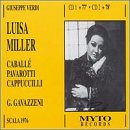| All Artists: Gaetano Donizetti, Giacomo Puccini, Giuseppe Verdi, Gianandrea Gavazzeni, La Scala Theater Orchestra, Leone Magiera, Montserrat Caballé, Luciano Pavarotti, Bruna Baglioni, Carlo Zardo, Carlo del Bosco, Piero Cappuccilli Title: Verdi: Luisa Miller Members Wishing: 0 Total Copies: 0 Label: Myto Records Italy Release Date: 9/9/2000 Album Type: Import Genre: Classical Style: Opera & Classical Vocal Number of Discs: 2 SwapaCD Credits: 2 UPCs: 789368541621, 608974501563 |
Search - Gaetano Donizetti, Giacomo Puccini, Giuseppe Verdi :: Verdi: Luisa Miller
 | Gaetano Donizetti, Giacomo Puccini, Giuseppe Verdi Verdi: Luisa Miller Genre: Classical
|
Larger Image |
CD Details |
CD ReviewsINADEQUATE RODOLFO AND LUISA BUT A MAGNIFICENT MILLER jfmaniaci | Broadbeach, Queensland, Australia | 09/01/2001 (3 out of 5 stars) "Luisa Miller is among my favorite operas by Verdi. It is an opera with an ardent musical texture composed especially for the tenor. He has to display pure mezza voce, romantic temperament and fiery emotions. In "Quando le sere al placido chiaror", perhaps the most beautiful and certainly one of the most inspired arias composed by Verdi, the tenor has to offer rare and incisive accents. Pavarotti never imposed himself in the Verdian repertory. In this CD recorded live in 1976 at La Scala, Milan, he does not possess the vocal qualities for the part of Rodolfo. He sings with a voluminous and easily extended voice but not romantic, warm and virile enough. For a tenor of his commercial fame, he "croons" with a dreadful mezza voce and resorts repeatedly to falsetto. The silvery brilliance of his voice (of the mid sixties) in the Duke of Mantua, Rodolfo (Boheme) and Romeo and Juliet, has gone inexorably away! Even the base colour and pulp show signs of evident wear. His characterisation of Rodolfo is a disaster! He is no Lauri Volpi, the legendary tenor who sang the premiere at the Met in 1929 with a cast that included Rosa Ponselle, Giuseppe De Luca and Tancredi Pasero! Caballe', the great Catalan with Spanish blood in her veins, is reputed to be one of the bel canto voices of the XX century together with Toti Dal Monte, Callas, Sutherland and Gencer. In this CD, her voice is an all-enchanting falsetto. She sings deliciously but her top notes have a marked shrill and the dramatic role of Luisa does not suit her type of bel canto singing. The trouble with Caballe' is that she adapted the score of Luisa to her vocal means, forgetting the composer's musical intentions and orchestral necessities. In dealing with the score, she needed to exercise, study and frequent dress rehearsals: all of them, with humbleness, as the divina Callas used to do.Cappuccilli, as Miller, Luisa's father, comes to the rescue vocally and as a magnificent Verdian character. The voice is all there: colour, extension, large capacity for particularly incisive phrasing and very mature, serious musicality. His forte is the squillo, endowed with a most notable resonance. His middle register shows charm and persuasive powers. Cappuccilli's voice is particularly suited to Verdian roles: Count di Luna, Iago, Giorgio Germont, Renato, Rigoletto, Don Carlo di Vargas and Amonasro. Last but not least that of Miller in the CD under review. He delighted me with a happy union of biting and, at the same time, painful accents.The recorded sound is what you would expect from a 1976 live performance in an opera theatre such as La Scala of Milan, Italy. Poor arrangement of the microphones, close to the orchestra pit and theatre first rows with notable, fastidious coughs by the audience, distant from the stage whereby the voices sound bottled up, as if they were behind the stage curtains. The orchestra sound is reasonable, at times drowning the singer's top notes (particularly Rodolfo's in the final squillo). The conductor, the veteran Gavazzeni, has a firm hand but the pulse is slow at times. The unusual and famous duet between the two basses, Walter and Wurm, in Act II, Scene III, starts almost pianissimo (!). Walter's "O meco incolume sarai, lo giuro," is a frenetically ringing line but sung at a disappointingly slow orchestral accompaniment. The book-note is ordinary, uninformative and includes the libretto in well spelt Italian only. The track numbers are in bold characters and usefully appended to the lyrics."
|

 Track Listings (27) - Disc #1
Track Listings (27) - Disc #1